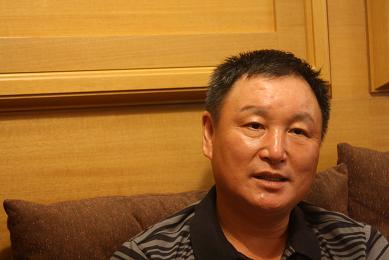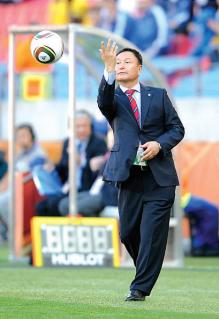Huh Jung-moo, the man behind the 2010 World Cup

Annals: How was your life at Yonsei University
As a member of the national team, I had to go to Taeneung Training Center
What do you recall the most about the classes that you did take?
I remember most my elementary chemistry class. The professor who taught it was infamously strict, even with the student athletes. I went to class as many times as I could and took careful notes, but the class was very difficult for me, as I had not studied much previously. During the exam, I panicked. I just sat thinking about what I should do when the professor, proctoring the exam, came over and asked, "It's hard, eh?" I just told him I was completely stumped. I thought I would fail the class, but instead I got a B. I think he regarded my effort to come to class and take diligent notes highly.
I remember most my elementary chemistry class. The professor who taught it was infamously strict, even with the student athletes. I went to class as many times as I could and took careful notes, but the class was very difficult for me, as I had not studied much previously. During the exam, I panicked. I just sat thinking about what I should do when the professor, proctoring the exam, came over and asked, "It's hard, eh?" I just told him I was completely stumped. I thought I would fail the class, but instead I got a B. I think he regarded my effort to come to class and take diligent notes highly.
What was the most difficult part about being an athlete?
The most difficult aspect was the competition. As I started soccer late compared to everyone else, I had to put in a lot of work to get the same results and to succeed. Every morning I would run up the mountain behind the President's Residence on campus. There was a spring at the top of the hill. Once I reached it, I would jog back to the gymnasium. The bushes, lining Baikyang-ro from the gym to the main entrance, were spaced about five meters apart. I would jump over them, using them as hurdles. After I finished, I would go back to the dormitory to eat breakfast before class. In order to become a better player, I also did not drink alcohol. After school, I would go to Doksuri cafe or Doksuri billiard room under the railroad bridge instead of a bar.
What is the difference between being an athlete and a coach?
A coach teaches. Teaching is a difficult job and a good player is not guaranteed to be a good coach and vice versa. When I first started coaching at the Pohang Steelers, I was very strict. I criticized the players for not practicing in the right way and could not understand why they could not fix the problems even after they were pointed out. My family and close friends told me that I was being too forceful and inflexible. They told me to turn a blind eye sometimes and to think more about how to tell the players about their faults. I realized that my attitude was wrong, so I changed my ways, finding new strategies to communicate with the players.
A coach teaches. Teaching is a difficult job and a good player is not guaranteed to be a good coach and vice versa. When I first started coaching at the Pohang Steelers, I was very strict. I criticized the players for not practicing in the right way and could not understand why they could not fix the problems even after they were pointed out. My family and close friends told me that I was being too forceful and inflexible. They told me to turn a blind eye sometimes and to think more about how to tell the players about their faults. I realized that my attitude was wrong, so I changed my ways, finding new strategies to communicate with the players.
What kind of infrastructure is necessary for the development of better players in Korea
A close look at the 2010 World Cup reveals that the biggest difference between the best teams in the world andKorea Korea
A close look at the 2010 World Cup reveals that the biggest difference between the best teams in the world and
Another problem is that the current system to learn soccer is expensive and requires a lot of attention from parents. The parents have to pay a lot to have their child participate in a team and go through the training. They also have to drive the kids around to the practices and games. Even after having invested so much, they worry constantly and talk to the coaches often. These institutes should be a place to which parents can entrust their children. Having retired as the coach of the national team, I am putting much effort into creating this kind of infrastructure at the Yongin Football Club, where I am in charge.

Why did you choose to resign as the coach of the national team?
Even before the World Cup started, I was planning to quit afterwards. InKorea
Even before the World Cup started, I was planning to quit afterwards. In
Any last words for Yonseians?
Yonsei University Yonsei University
Roh Shin-young
shiny922@yonsei.ac.kr

